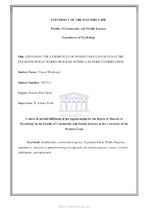| dc.contributor.advisor | Pedro, Athena | |
| dc.contributor.author | Windvogel, Clinton | |
| dc.date.accessioned | 2019-05-23T12:16:42Z | |
| dc.date.available | 2019-05-23T12:16:42Z | |
| dc.date.issued | 2019 | |
| dc.identifier.uri | http://hdl.handle.net/11394/6833 | |
| dc.description | Magister Psychologiae - MPsych | en_US |
| dc.description.abstract | The economic state of South Africa prior to 1994 is linked directly to the political dispensation that was operating under apartheid. Since the advent of the new democratic dispensation, the South African government has developed policies which have focused on poverty alleviation. However, given all the gains (political equality) that have been made, South Africa still remains one of the highest in the world in terms of income inequality. Income inequality is an indicator of how material resources are distributed across society. Within the context of South Africa’s income inequality is largely due to the history of colonialism and. To address this income inequality, the government initiated job creation initiatives in 1995 which was implemented by institutions such as government departments and parastatals such as the nature conservation agency under research. A qualitative methodological framework was used for this study to explore the subjective experiences of the beneficiaries involved in the Expanded Public Works Program within the nature conservation agency. For the purpose of this study purposive sampling was utilised since only specific participants from four specific reserves were selected to participate in this study. The sample for this research study comprised of 24 participants. These participants were selected from each of the 4 selected reserves. Semi-structured interviews were utilised to gain a thorough understanding of the participants’ subjective experiences. Upon completion of these interviews the information was transcribed and analysed using the interpretive phenomenological approach. Before commencement of the study, the necessary ethics approval was obtained from the Humanities and Social Sciences Research Ethics Committee at the University of the Western Cape. Participants’ rights such as anonymity, confidentiality, voluntary participation, and confidentiality were guaranteed throughout the research process. | en_US |
| dc.language.iso | en | en_US |
| dc.publisher | University of the Western Cape | en_US |
| dc.subject | Conservation | en_US |
| dc.subject | Expanded Public Works Programme (EPWP) | en_US |
| dc.subject | Unemployment | en_US |
| dc.subject | South Africa | en_US |
| dc.title | Exploring the experiences of beneficiaries involved in the expanded public works program within a nature conservation | en_US |
| dc.rights.holder | University of the Western Cape | en_US |

